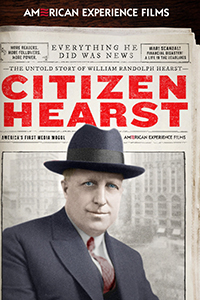 Citizen Hearst (American Experience PBS, 2021)
Citizen Hearst (American Experience PBS, 2021)
A review by Brad Keister, former Deputy Division Director of the Physics Division for the National Science Foundation. In 2018, Brad retired from the more formal demands of research and teaching, and lives in northern Virginia.
This PBS miniseries (two parts, four hours) traces the life of William Randolph Hearst (1863-1951), who was arguably the most influential media titan of the first half of the twentieth century. Hearst leveraged his father’s vast fortune to build a publishing empire and to leave his stamp on the media that persists to this day. As a young man, William built up The San Francisco Examiner, then a backlot publication, into the city’s dominant paper. He used the money to hire the best writers in the business. But then he remade the newspaper into a garish tabloid, focusing on anything that would grab the attention of a common reader, making use of large headlines, sensational photos, and in many cases untruths, all to sell papers and increase circulation. This was a huge change from newspapers up to that time, which consisted of small, uniform, dense text and, as one commentator put it, every day’s paper looked like that of any other day. Having conquered San Francisco, Hearst turned his insatiable ambition to New York, where he eventually dominated his rival, Joseph Pulitzer, in a city that at the time had dozens of papers. From there it was a matter of time as Hearst began to acquire newspapers across the country. He took a personal interest in the details of his papers, including the headlines, and language in the articles, thus putting his personal stamp on a media empire with millions of subscribers. His power rivalled heads of state: some argue that his was the prime influence for pushing the United States into war with Spain. Hearst’s influence eventually went into decline as he overspent his vast fortune, and creditors took over the business. The Hearst story was also the inspiration for Orson Welles’s film Citizen Kane (from which the PBS series name is derived). Hearst suppressed any mention of the film in his publications. As the commentators in this series emphasized, it is hard to think about the media world before Hearst, who literally changed the way we think about news. Nowadays we expect to be informed every day about events in the world, but it was not always thus. We may do well to rethink our expectations in today’s world of superheated, instantaneous media.
Dan Clendenin: dan@journeywithjesus.net


